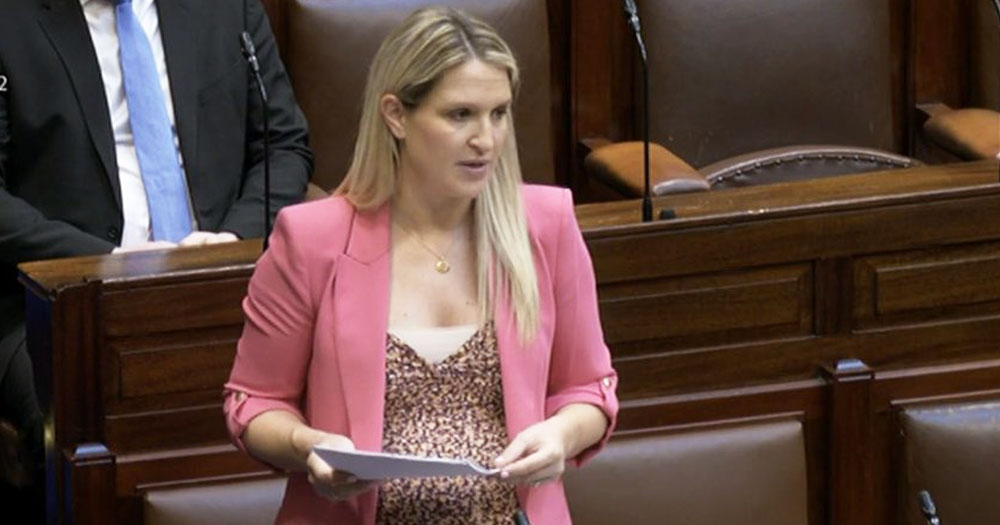The new Irish hate crime Bill went through its initial discussion in the Dáil yesterday, November 10. While the progress on the legislation is welcome, stakeholders have stressed that the proposed law legislation represents “only one piece of the puzzle” and more needs to be done.
Minister of Justice Helen McEntee brought the Incitement to Violence or Hatred and Hate Offences Bill 2022 before the Dáil for its second stage yesterday. The Bill was published on October 27 and if passed, it will introduce “aggravated” versions of existing criminal offences in cases in which such offences are motivated by hatred against a victim’s “protected characteristics”.
“Members of minority and vulnerable communities have spoken time and again about the horrendous and unacceptable prejudice, contempt and hostility they face daily,” said Minister McEntee when she introduced the Bill to the House.
“These communities deserve to be protected, to have their identities and cultures celebrated and to live without fear of victimisation simply because of who they are,” she added. “This new legislation will contribute fundamentally to allowing everybody in Ireland to live without fear as they live the most authentic version of themselves.”
LIVE NOW: Minister @HMcEntee presenting the Incitement to Violence or Hatred and Hate Offences Bill 2022 at the Dáil, starting 2nd stage discussion. Follow it here: https://t.co/WELakTL59y pic.twitter.com/GoxwZiuMxq
— Luna Lara Liboni (@LunaLiboni) November 10, 2022
In addition, if signed into law, the Bill will make communication or behaviour that is likely to incite hatred on the basis of a series of protected characteristics a criminal offence, with a penalty of up to five years in prison.
In reference to this subject, Minister McEntee said: “The right to free speech is not absolute, and limits may be placed on it by law to protect other fundamental rights. I am confident that this Bill strikes the correct balance in protecting freedom of expression with the rights of minority and vulnerable communities to be protected from hate speech.”
Her words were echoed by Sinn Féin TD Pa Daly, who stated: “Of course, we believe in the fundamental right to free speech, but this core right should not be allowed to be abused to incite hate, prejudice or violence against others. Freedom of speech is not a one-way street, and the vulnerable must be protected and feel that they are safe and protected.”
One of the main points of discussion during the debate was the need for a more clear definition of what constitutes “hatred”. Some members of the House suggested aligning the definition of “hatred” with what the Council of Europe Commission Against Racism and Intolerance proposes, as it was also recommended by the Irish Council for Civil Liberties.
Together with our partners from the Coalition Against Hate Crime we were delighted to meet the Minister for Justice Helen McEntee TD tonight to mark the introduction of the Incitement to Violence or Hatred and Hate Offences Bill 2022 which will be debated in the Dáil tomorrow. pic.twitter.com/nVAriakoX5
— LGBT Ireland (@LGBT_ie) November 9, 2022
The definition in question would define hatred as “a state of mind characterised as intense and irrational emotions of opprobrium, enmity and detestation towards the target group”.
Some members of the Dáil stated that they opposed the hate crime Bill on the grounds that it doesn’t adequately protect freedom of expression and that it contains unclear definitions, including the definition of “gender”.
Speaking about the new legislation, LGBT Ireland CEO Paula Fagan said: “We want to see it passed, enacted and enforced quickly”. She added, “No one should be attacked leaving a gay bar. No one should be shouted at on the street, and no one should feel unsafe travelling home at night. Action is needed to make our streets safer.
“It is also crucial that the Gardaí have a robust Diversity and Inclusion Strategy as well as well-trained and well-equipped Garda Diversity Officers who understand the needs of our community and respond appropriately.”
Fagan concluded, “We must ensure that when people feel unsafe, they can reach out to the Gardaí for help, support and protection.”
© 2022 GCN (Gay Community News). All rights reserved.
Support GCN
GCN is a free, vital resource for Ireland’s LGBTQ+ community since 1988.
GCN is a trading name of National LGBT Federation CLG, a registered charity - Charity Number: 20034580.
GCN relies on the generous support of the community and allies to sustain the crucial work that we do. Producing GCN is costly, and, in an industry which has been hugely impacted by rising costs, we need your support to help sustain and grow this vital resource.
Supporting GCN for as little as €1.99 per month will help us continue our work as Ireland’s free, independent LGBTQ+ media.
